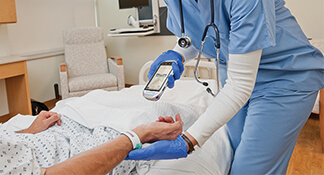Every year the UK’s NHS (National Health Service) faces hundreds of millions of pounds in clinical negligence claims. One of the key causes being patient misidentification. The National Patient Safety Agency states this causes 19% of all hospital errors.
UK Government estimates that errors associated with mistaken identity cost the NHS approximately £2 billion (about $3.1 billion) in extra bed days. Similarly, the NHS continues to come under attack for inefficiency. Despite this, many hospitals have been unable to improve accountability with any significant results. Operation delays are one of the patients’ top complaints. Currently, there are an estimated 80 minutes per day wasted due to slowness in getting patients to the theater on time.
The Birmingham Heartlands Hospital is part of The Heart of England NHS Foundation Trust. It is one of the largest in England serving half a million people and caring for 574,000 patients a year. In this busy hospital environment, information accuracy is essential for providing the best possible patient care. Determined to reduce errors and improve efficiency, The Birmingham Heartlands Hospital needed to develop a new system for managing patient identification through the operation process.
Radio tagging to avoid misidentification
“We wanted to take advantage of the latest technology to implement new patient safety standards and improve the efficiency of our operating theaters,” said consultant surgeon David Morgan. “We rely on patients’ wristbands to give us the right information to provide every aspect of their treatment from administering medication, transfusing blood to carrying out surgical procedures. Given its critical role in patient care, any system we developed had to based around the RFID wristband.”
Heartlands Hospital worked with Zebra to develop a new process that used technology to drive patient safety and efficiency. The resulting solution combines Radio Frequency Identification (RFID) tagging with real-time process software using PDAs and Zebra® printers and wristbands. When admitted, the patient is photographed and given a printed wristband with an embedded RFID tag. The patient’s digital image is part of the patient record identification through the operation process.
All clinicians involved in the operation have wireless PDAs for viewing operating lists and patient records. On approaching the patient, clinicians use their PDA to identify the patient or scan the patient’s RFID tag. All pre-operative checks are then recorded on the PDA which immediately updates the operating list.
A ‘traffic lights’ warning system, which changes from red to green in the patient record, is used to ensure all the pre-surgery required checks have been performed. When patients are sent to the theater the reader identifies them from the RFID tag and retrieves the appropriate record on the screen, ensuring there is no opportunity for misidentification.
Theater efficiency is automatically measured at each step in the process is recorded with a time and date stamp – the procedure is coded by the operating surgeon to improve efficiency and further reduce administrative time.
Reducing operation waiting times
The initial pilot in the Ear, Nose and Throat (ENT) day surgery unit enabled the hospital to complete one extra operation per day, the equivalent of an additional 672 simple or intermediate procedures per year. This generates an additional unplanned income of between £70,000 ($107,835) and £270,000 ($415,935) per year (depending on the type of procedure).
In addition to ensuring the safety and efficiency of the operation process, the system can be used to support other processes such as DVT (deep vein thrombosis) risk assessment, Admission, Discharge &Transfer (ADT) and any other procedures that require identification verification. Similarly, it can be used to help monitor infection linked to patients, beds and staff. Also, if a biopsy or test is undertaken in theatre, the correct patient label can be printed immediately which avoids mislabelling.
Morgan continued: “We have not had a single mistake while using the system. Patients feel more confident as we’re taking safety to a higher level. The theater runs more efficiently because there is less waiting time for patients. The accuracy of coding has now increased to almost 100 percent as the coding is done by the operating surgeon on their PDA at the time of surgery. What’s more, staff have been able to spend more time with their patients as a result of less paperwork – further helping to improve patient satisfaction.”
Following the successful pilot, the Trust decided to implement the system throughout the hospital. Today it is used in 4 wards and 4 operating theaters, with plans to extend the roll-out within the next 12 months.
At the launch of “Coding for Success”, the advisory document on auto identification in the NHS that took place at the hospital, Lord Hunt, Minister of State for Quality at the Department of Health, recognized Heartlands Hospital as a leading example of how auto identification can be used to drive quality and safety.
“By pioneering RFID to improve the operation procedure, Heartlands Hospital is raising the bar for patient safety and operational efficiency,” added Aileen McHugh, EMEA vertical marketing manager for healthcare at Zebra Technologies Europe. “While the benefits of using RFID in the retail, aerospace and manufacturing sectors have been much talked about, little has been made to date of the possibilities for healthcare. RFID tagging is ideal for patient identification as the wristband can be read without disturbing the patient. The fact that the hospital has experienced no mistakes since the new system’s implementation and has been able to carry out more daily operations, demonstrates the reliability of RFID technology and paves the way for other NHS trusts to follow.”


